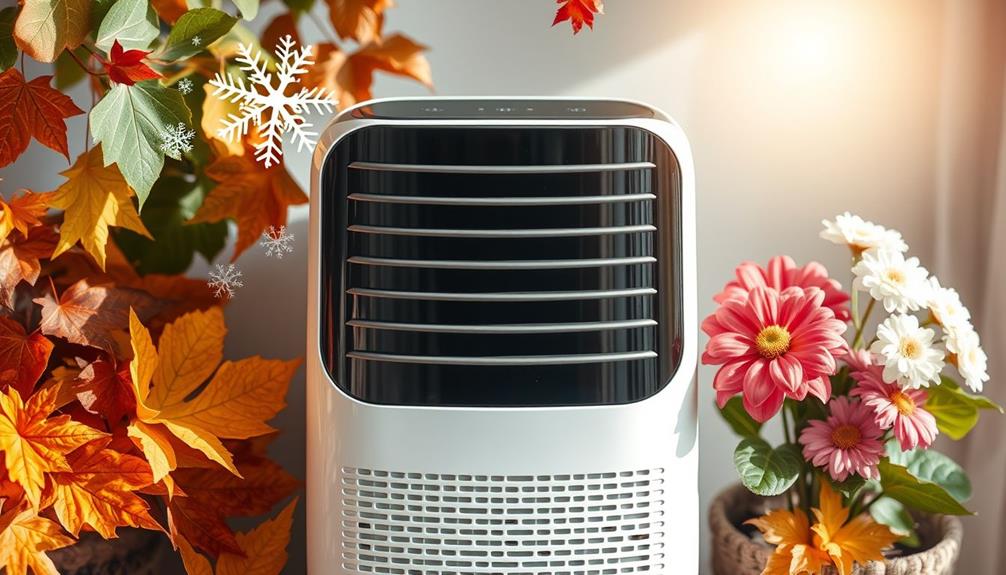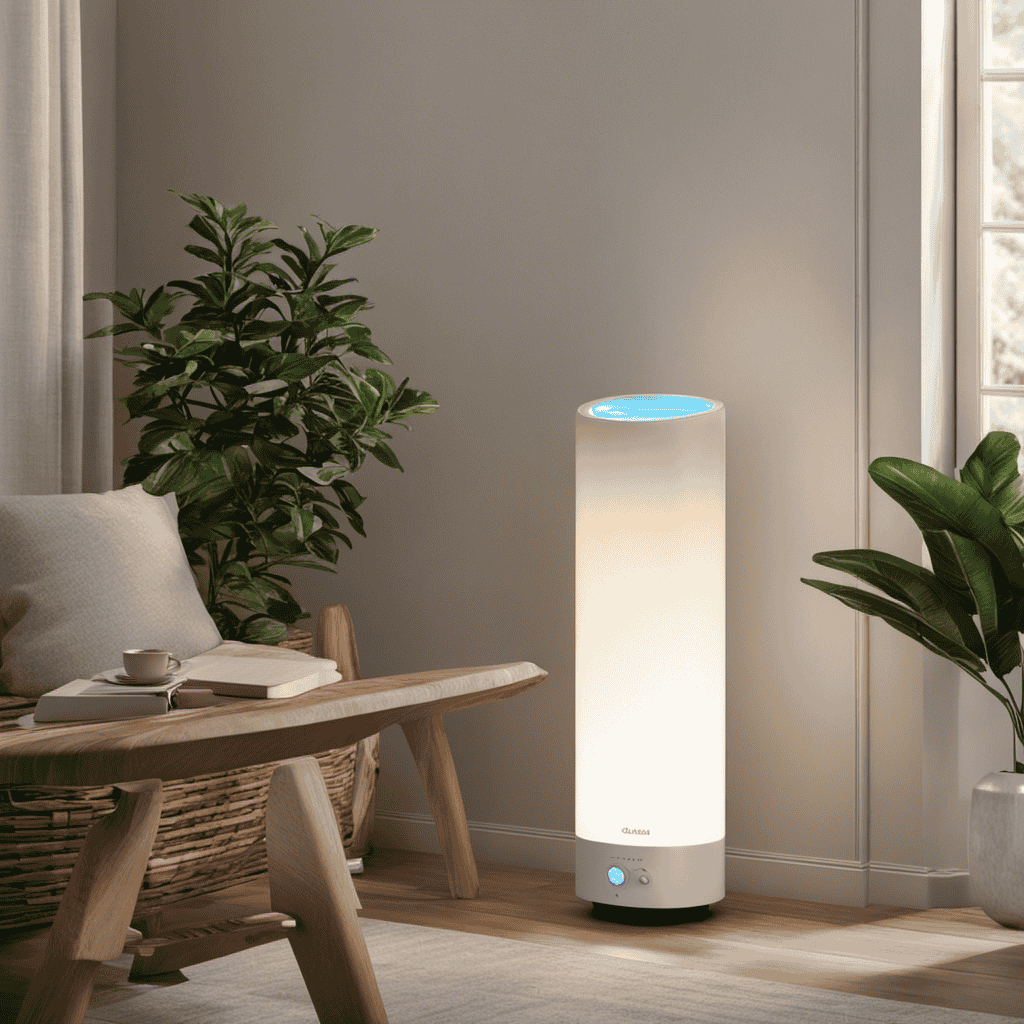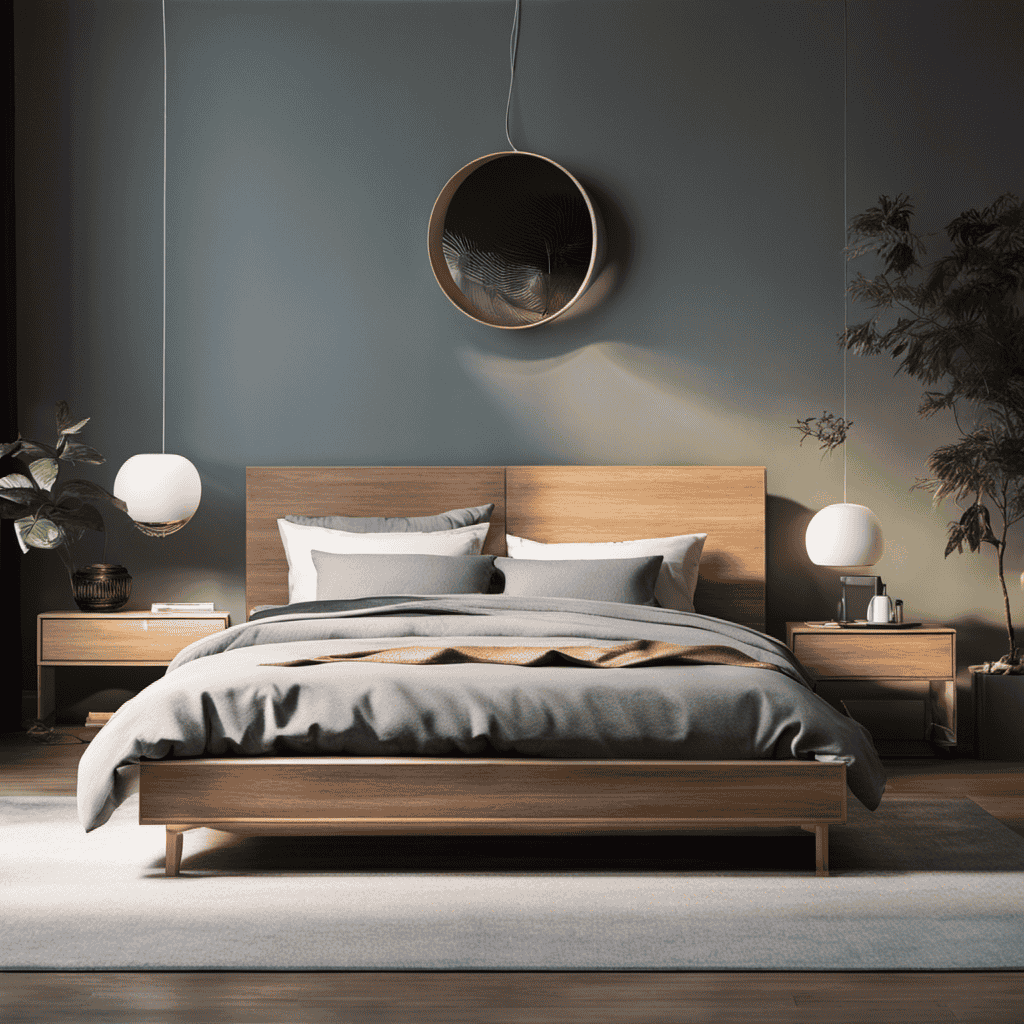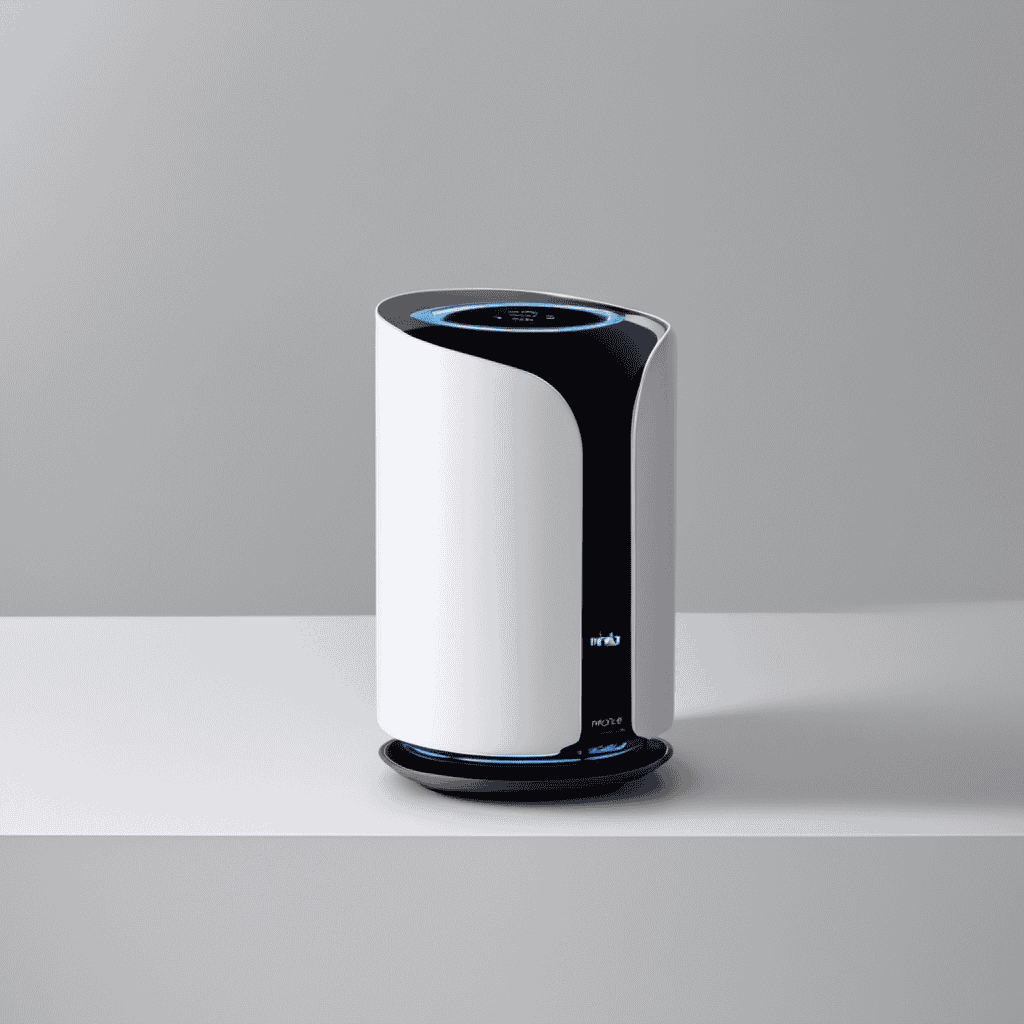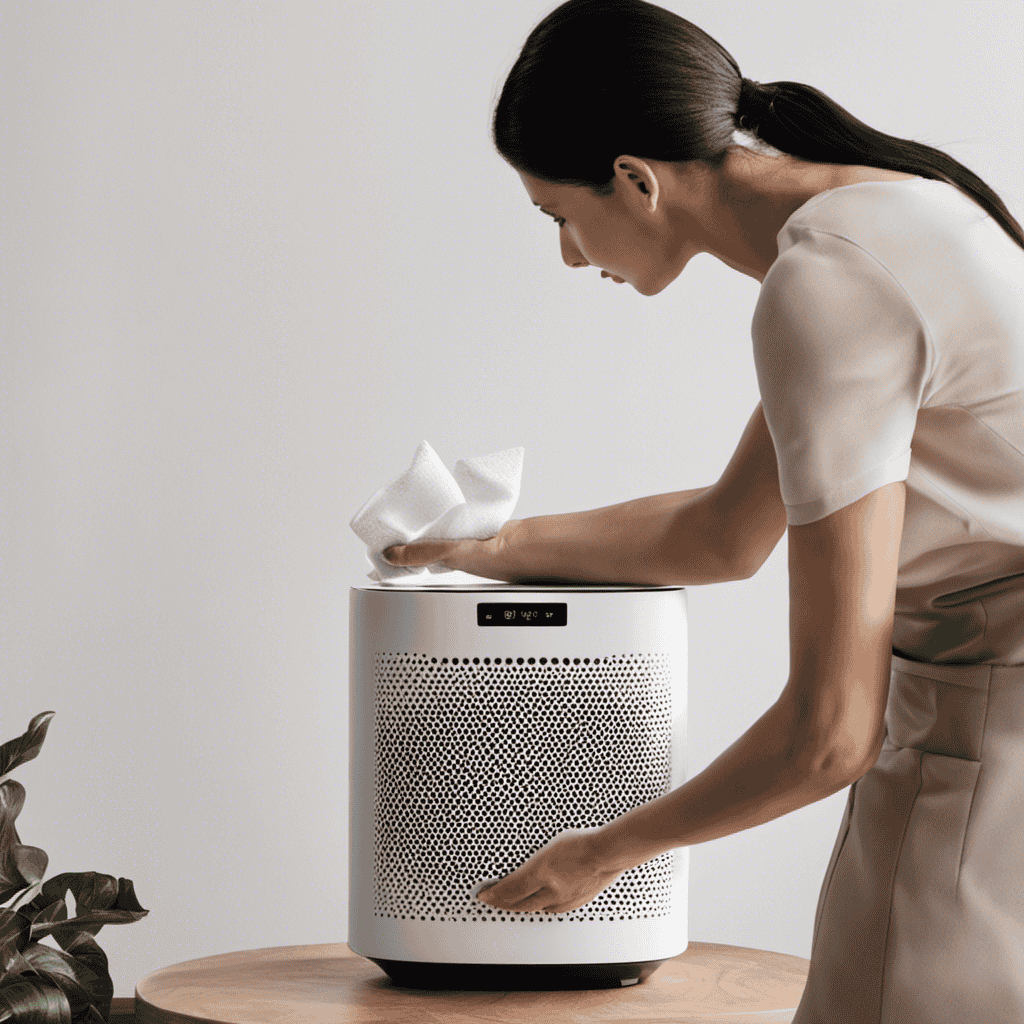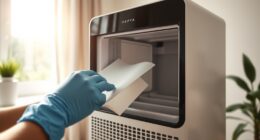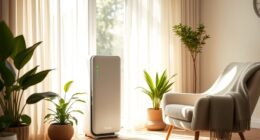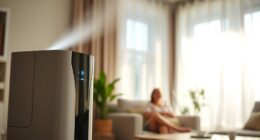Seasonal maintenance of your air purifier is essential for fresh, healthy indoor air. Start by changing filters every 3-6 months to guarantee efficiency, especially in high-pollution seasons. Keep the surrounding area clean by dusting surfaces and vacuuming regularly to minimize debris. Position your purifier away from walls and in sealed rooms for ideal airflow. Don't forget to clean washable pre-filters monthly to enhance efficiency, especially if you have pets. With these tips, you can improve air quality while extending your purifier's lifespan, and there's even more to discover about other effective maintenance strategies.
Key Takeaways
- Change filters every 3-6 months, particularly during seasonal changes, to maintain optimal efficiency and air quality.
- Clean washable pre-filters monthly by vacuuming or rinsing, following manufacturer guidelines for best results.
- Regularly wipe down surfaces around the air purifier to minimize dust buildup and maintain airflow.
- Ensure air purifiers are positioned in sealed rooms, away from walls and high-traffic areas for peak performance.
- Schedule professional maintenance every 3-5 years to thoroughly clean filters and ducts, ensuring optimal operation.
Importance of Regular Maintenance
While you mightn't think about it often, regular maintenance of your air purifier is vital for keeping it running efficiently and effectively. When you prioritize upkeep, you help guarantee peak performance levels and extend the lifespan of your unit, which means years of clean air for you and your family.
Regularly checking the unit's filters, such as in Honeywell models, is an important part of this process and can greatly contribute to its efficiency.
Timely filter replacements and routine cleaning are key tasks that greatly boost your air quality. They prevent dust buildup that can restrict airflow, leading to increased energy costs and noise levels.
Familiarizing yourself with the User Manual can guide you on specific maintenance tasks and schedules tailored to your model, making it easier to stay on top of things.
Proactive care not only enhances the effectiveness of your air purifier but also supports the overall well-being of your household. By reducing airborne contaminants, you minimize the risk of respiratory issues linked to poor indoor air quality.
Cleaning the Surrounding Area

To keep your air purifier working at its best, make sure the area around it's dust-free.
Regularly wiping down surfaces and monitoring dust buildup near the unit is essential, as this can hinder airflow and reduce efficiency.
Incorporating a healthy lifestyle approach into your cleaning routine can further enhance the air quality in your home.
A clean environment not only supports your purifier but also boosts your overall indoor air quality.
Dust-Free Environment Importance
Maintaining a dust-free environment around your air purifier is vital for its best performance. Dust buildup can impede the air purification process, leading to reduced efficiency.
To keep your air purifier functioning at its finest, focus on regular maintenance of the surrounding area and consider how astrology shapes personal confidence that can influence your motivation to maintain a clean space.
Here are a few key tips:
- Dust Surfaces: Regularly dusting surfaces near your air purifier minimizes visible debris, allowing the unit to concentrate on filtering unseen allergens.
- Vacuum Frequently: Use a vacuum to remove dust accumulation around the air purifier's exterior grills and panels. This prevents airflow restrictions and maintains peak air circulation.
- Follow Manufacturer Instructions: Adhering to the specific cleaning guidelines provided by your air purifier's manufacturer guarantees effective operation and prolongs its lifespan.
A clean environment not only enhances the performance of your air purifiers but also contributes to improved overall indoor air quality.
Prioritizing air quality is essential for your respiratory health, so make it a habit to keep the area around your air purifier tidy. This simple maintenance step can have a significant impact on your home's air quality and your well-being.
Regular Surface Cleaning Tips
Keeping the area around your air purifier clean is crucial for its performance. Regularly clean the surfaces and vacuum these areas to minimize allergens and visible debris. Dust buildup can hinder airflow, reducing your unit's ability to clean the air effectively. Establish a routine cleaning schedule, ideally performing surface cleaning at least once a month.
Here's a quick reference table to help you with your cleaning routine:
| Task | Frequency |
|---|---|
| Dust surfaces around | Weekly |
| Vacuum surrounding floors | Weekly |
| Wipe down unit exterior | Monthly |
| Check for dust buildup | Monthly |
| Replace filters | According to model |
Utilize a damp microfiber cloth for surface cleaning, avoiding harsh agents that could damage your air purifier. Regular maintenance not only enhances the air quality in your home but also prolongs your unit's lifespan. By keeping the area around your air purifier tidy, you're ensuring it operates at peak efficiency, so don't overlook this crucial step in your air purifier maintenance routine.
Minimizing Airborne Contaminants
A clean environment around your air purifier greatly boosts its ability to cleanse the air effectively. By reducing dust and dirt buildup, you guarantee proper air intake and enhance the overall efficiency of your device.
This is especially important during seasonal allergies, when pollen and other allergens are prevalent. Keeping your home free of dog health hazards can also help reduce airborne contaminants, especially if you have pets that shed or have dander.
To maintain a contaminant-free area, follow these steps:
- Regularly dust and vacuum surfaces near the air purifier to minimize allergens like pet dander and pollen.
- Monitor dust accumulation on the exterior grills and panels of the air purifier; even small amounts of debris can hinder performance.
- Establish a filter maintenance schedule to keep your air purifier operating at peak efficiency.
Effective Filter Management
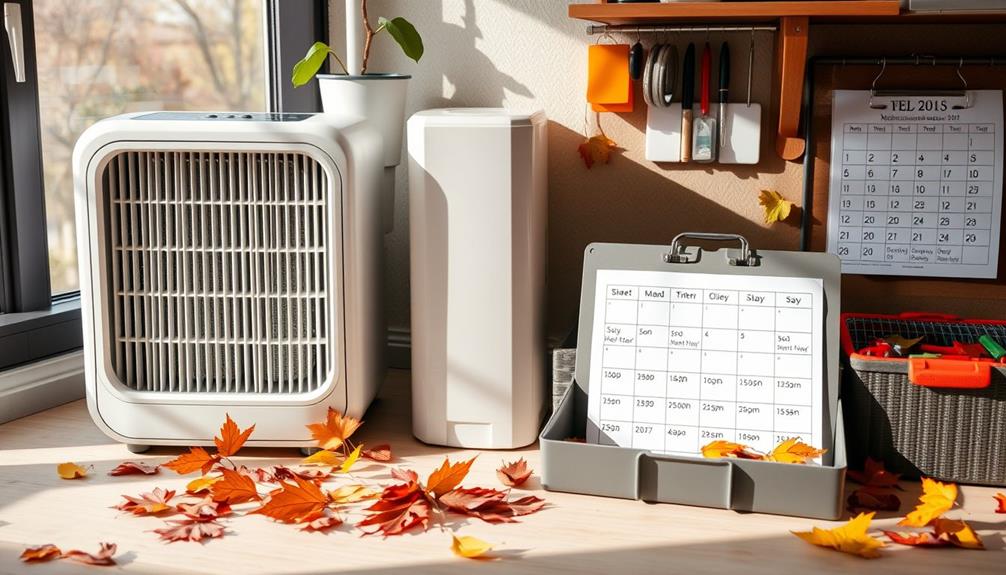
To keep your air purifier running efficiently, regular maintenance is essential, especially during seasonal changes when dust and allergens may increase.
Clogged filters can cut efficiency by up to 50%, so staying on top of this task is vital.
Make sure to take into account the energy consumption of your appliance to optimize its performance and reduce costs, as many appliances draw power even when not in use, contributing to phantom load energy consumption patterns.
Don't forget to clean washable pre-filters monthly to help prolong the life of the HEPA and carbon filters.
Monitor Filter Condition
Regularly monitoring the condition of your air purifier's filters is essential for maintaining ideal air quality in your home. Clogged filters can greatly reduce airflow and overall efficiency, leading to a decline in air quality.
To keep things running smoothly, utilize the filter change indicator lights on modern air purifiers. These lights will remind you when it's time to replace or clean your filters, guaranteeing optimal performance. Additionally, maintaining a clean indoor environment can complement the effectiveness of your air purifier, as it reduces the amount of particulate matter circulating in your home. This practice aligns with holistic lifestyle approaches that support overall well-being.
To effectively manage your filters, consider these tips:
- Establish a filter maintenance schedule, replacing filters every 3-6 months, or more frequently in high-pollution areas.
- Clean washable pre-filters monthly to extend the life of your HEPA filters, which capture smaller particles and improve air quality.
- Always make sure filters are completely dry before reinserting them into the unit to prevent mold growth.
Change Filters Regularly
Changing filters regularly is essential for keeping your air purifier operating at peak performance. You should monitor and change your filters every 3-6 months, especially if you live in an area with high pollution levels. This practice guarantees that your air purifier maintains maximum efficiency and cleans the air effectively.
Additionally, implementing a reliable home security system can enhance your overall well-being by providing peace of mind while you focus on maintaining a healthy indoor environment.
Utilizing filter change indicator lights on modern air purifiers can be a helpful reminder for when it's time to replace your filters. Following the manufacturer's guidelines for specific replacement intervals is important to confirming your unit's effectiveness.
In addition to changing filters, remember that cleaning washable pre-filters monthly will help capture larger particles, ultimately extending the lifespan of the HEPA and carbon filters. This maintenance step is significant for keeping your air clean and fresh.
Always verify that filters are completely dry before reinserting them into the unit; this prevents mold and bacterial growth, which can compromise your air quality.
Clean Washable Prefilters
Keeping your air purifier in top shape includes cleaning washable pre-filters at least once a month. This simple maintenance task is vital for maintaining ideal airflow and preventing clogging from larger particles like dust and pet hair.
Regular cleaning can also be beneficial for pet owners, as cat health and nutrition may be affected by poor air quality. By regularly cleaning your pre-filters, you'll extend the lifespan of your HEPA filter and enhance your indoor air quality.
To effectively clean your washable pre-filters, follow these tips:
- Vacuum or rinse the pre-filter monthly to capture larger debris.
- If machine washing, use a gentle cycle and verify it's completely air-dried before reinstalling.
- Always check the manufacturer's guidelines for specific cleaning instructions and frequency recommendations.
Clean washable pre-filters not only improve your air purifier's efficiency but also reduce energy consumption. When pre-filters are clogged, your air purifier has to work harder, leading to increased energy usage.
Optimal Placement Strategies
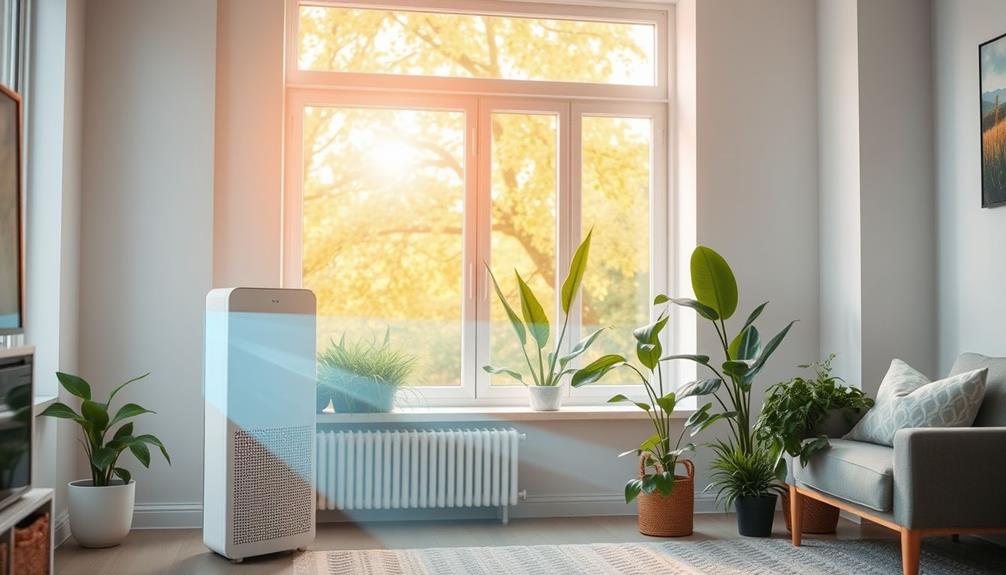
When it comes to maximizing the performance of your air purifier, placement plays a crucial role. To guarantee peak performance, position your air purifier in a sealed room with closed windows and doors. This strategy helps prevent contaminated air from entering and maintains the quality of the air you breathe.
Additionally, being aware of key factors in choosing a home cleaning service can enhance your overall home environment, as cleanliness impacts air quality.
Keep the unit a few feet away from walls or furniture to allow unrestricted airflow. This way, the air won't be wasted, and the purifier can efficiently take in and release purified air. Avoid placing the air purifier near open windows, doors, or high-traffic areas, as these locations can introduce more pollutants and disrupt clean air circulation.
Additionally, consider the size of your room. Choose an air purifier specifically designed for that space to boost its effectiveness in air cleaning. During peak pollen seasons, it's especially important to keep the purifier in areas where you spend the most time, like bedrooms or living areas, to greatly improve your indoor air quality.
Long-term Benefits of Maintenance
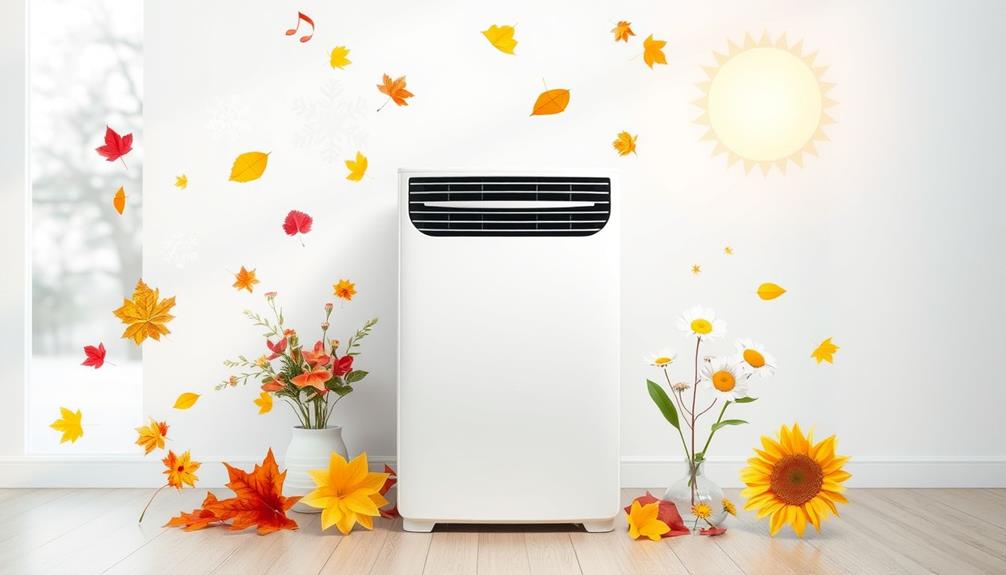
Regular maintenance of your air purifier offers significant long-term benefits that can transform your indoor environment.
By committing to routine maintenance, you're not just ensuring a cleaner space; you're also investing in your family's health and comfort.
Additionally, maintaining good air quality can aid in preventing respiratory issues, much like how cough with phlegm can arise from irritants in your environment.
Here are some key long-term benefits you can expect:
- Extended Lifespan: Regular upkeep can extend your air purifier's lifespan by several years, saving you money on replacements.
- Improved Air Quality: Timely filter changes and cleaning prevent dust and pollutants from building up, leading to consistently better air quality.
- Enhanced Efficiency: A well-maintained air purifier can operate up to 50% more efficiently, reducing energy consumption and lowering operational costs.
Professional Assistance Options
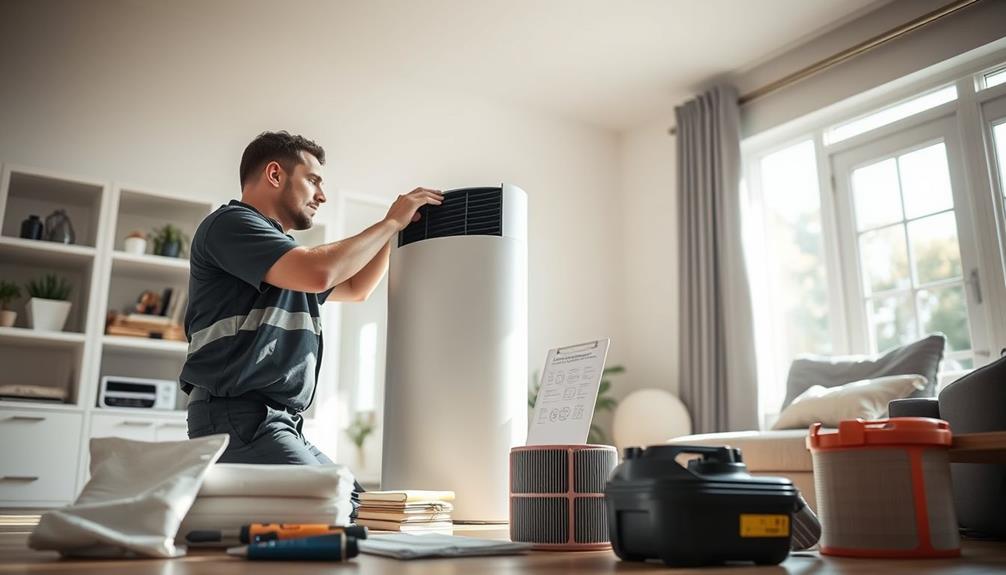
Maintaining your air purifier can sometimes feel overwhelming, but getting professional assistance can simplify the process. Consulting experts guarantees your purifier operates at peak efficiency and adheres to the manufacturer's maintenance guidelines. Companies like Climate Systems Heating and Air Conditioning offer tailored services that diagnose issues specific to your air purifier, providing effective solutions for any maintenance needs.
Regular professional maintenance includes thorough cleaning of air filters and air ducts, which is recommended every 3-5 years. This not only improves overall air quality but also enhances your purifier's performance. By scheduling an appointment with professionals, you can identify and resolve potential problems before they negatively impact your purifier's efficiency.
Additionally, professional assistance gives you insights into the best maintenance practices tailored specifically to your air purifier model. This guarantees longevity and ideal functionality, allowing your unit to serve you better.
Don't hesitate to seek help; the investment in professional maintenance can save you from costly repairs down the line and keep your HVAC system running smoothly. Remember, a clean air purifier is key to maintaining a healthy indoor environment.
Conclusion
By keeping up with seasonal maintenance, you're not just prolonging your air purifier's lifespan; you're also ensuring a healthier home environment. Isn't it worth a few extra minutes to breathe easier? Regularly cleaning the area around your purifier, managing filters effectively, and placing it strategically can make all the difference. Remember, a little effort today can lead to big benefits tomorrow. Don't wait until it's too late—give your air purifier the care it deserves!
